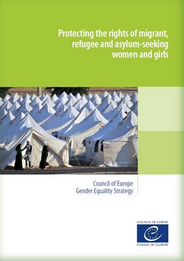52% of migrants who came to Europe in 2017 were women, according to the 2017 United Nations International Migration Report. Together with children, women and girls are the other most vulnerable groups most at risk from all types of abuses including trafficking, forced marriage or sexual exploitation. Up to 94% of them were trafficked for sexual exploitation in 2016.
For these reasons women require specific protection which should be ensured through a gender-sensitive approach in migration and asylum policies that take into account the particular harm or persecution that women may experience.
The Council of Europe has developed a number of legal instruments to cope with the protection of migrant women. The most significant is the “Convention on preventing and combating violence against women and domestic violence (Istanbul Convention)”. Its importance lies in the fact that state parties have to investigate allegations of sex-specific violence and prosecute the perpetrators. However, despite all the existing legal provisions, monitoring bodies like GREVIO-the Group of Experts on Action against Women and Domestic Violence report that many women and girls who migrated in recent years are subjected to various forms of violence in accommodation, reception and detention centres suffering from a lack of sanitary facilities, sex-segregated spaces, safe spaces or specialist counselling services.
The publication Protecting the rights of migrant, refugee and asylum-seeking women and girls details threats to, and gaps in, the protection of women travelling to and within Europe, and highlights challenges and opportunities for the integration of these women, noting that they constitute the largest over-qualified and under-employed group in Europe. The document further analyses gender stereotypes, stressing that migrant women often face double discrimination: because of cultural codes within their own communities and also due to stereotypes and institutional barriers in their host countries.
Paper copies of this publication available in English and French can be ordered via docrequest@coe.int
Source: The Council of Europe

